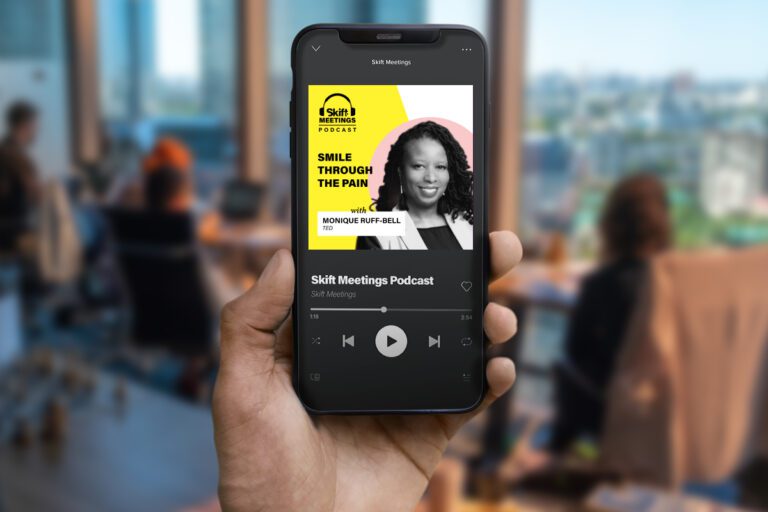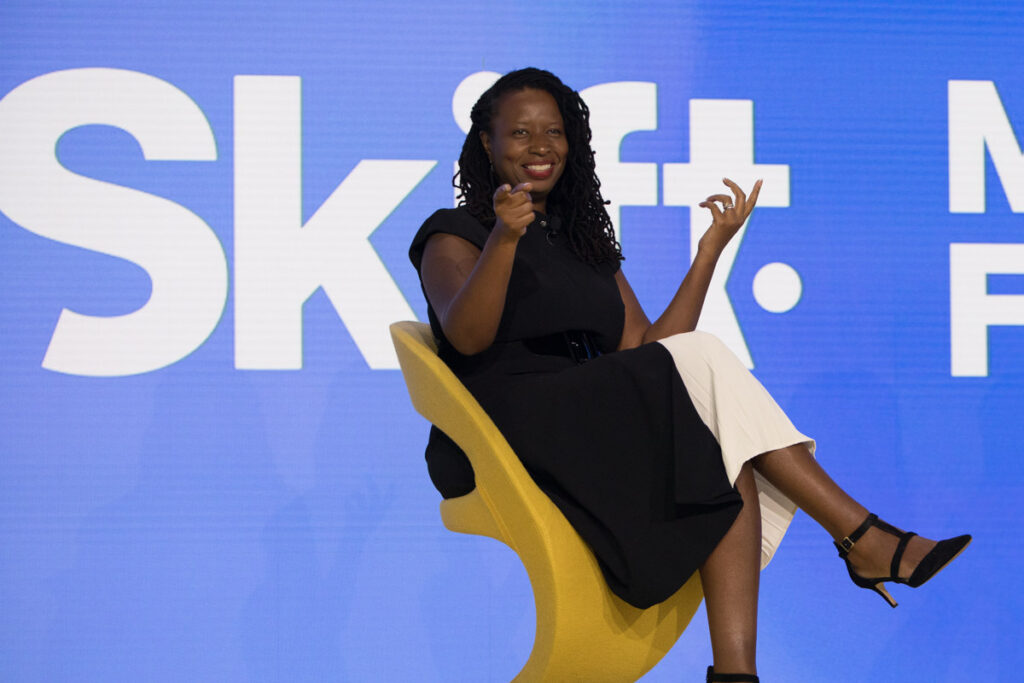As TED’s chief projects and strategy officer, Monique Ruff-Bell oversees the organization’s flagship global events and conferences, as well as other key marketing verticals. Most people know TED because of flagship events such as TED, but there were also 3,400 other events held in 142 countries last year, attracting 600,000 participants from local communities.
Women leaders in meetings is a new series celebrating outstanding female leaders who are not only excelling in the meetings and events industry, but championing inclusion and diversity at the highest levels. Each month, we spotlight women who are breaking barriers, helping others rise, and leaving a lasting legacy of empowerment. These leaders are redefining success by cultivating a more inclusive industry and paving the way for future generations. Join us as we salute the achievements and impact of these inspiring women who have made a difference in the meetings and events world.
What qualities do you think make a good leader?
Great leaders inspire trust, communicate effectively, collaborate, and care not only about success metrics but also about the professional development of their team. They balance vision with empathy, providing clear direction while remaining approachable, supportive, and empowering.
How would you define your leadership style?
My leadership style is a combination of collaborative, people-centered, quiet leadership and empowerment. I prefer to earn respect through a calm presence and thoughtful behavior. You don’t have to be the loudest, most dominant, or most confident person in the room. This influence can be achieved through humility, emotional intelligence, and actions speaking louder than words.
I strive to combine strategic thinking with emotional intelligence. I started valuing emotional intelligence when I met people who behaved exactly the opposite. See people who interrupt or ignore others, overreact to small problems, are overly critical, selfish, or insensitive. That’s not what I want. Leaders always get the best out of me when they are supportive, empathetic, clear, focused, and great teachers. So I want to treat people the way I like to be treated, which means leaning into emotional intelligence and practicing it as much as possible. Additionally, I learned from mentors who modeled strong emotional intelligence.
What skills have you developed that have helped you grow into the leader you are today?
Key skills I developed include strategic thinking. Balancing short-term goals with long-term vision, thinking about how we continue to evolve and how we plan for long-term and sustainable growth.
emotional intelligence quotient – Understand and manage my and my team’s emotions.
communicate effectively Ensure clarity, active listening, and promote open dialogue. I’ve been thinking about how to demonstrate effective communication skills in managing teams both upward and downward.
As a leader, what challenges keep you up at night?
Budget, cost, create and lead best-in-class teams.
Another major challenge is balancing ambitious goals with available resources.
Finally, the growing polarization in the country and its impact on the way conferences are held is a real challenge. This is reflected in the sensitivity of content curation and how to strike a balance between addressing pressing social topics and avoiding polarizing issues that may alienate audience segments, locations and supplier selections, where you must navigate the political climate of different regions to ensure inclusivity and accessibility while mitigating potential backlash.
Which female leaders inspire you the most?
My mother is one of them. She was a single mom who worked two jobs for 30 years to make sure I had everything I needed. She is my north star on how to work hard, love hard, and fight for my dreams.
Business leaders also inspire me. Ursula Burns was the first black woman to lead a Fortune 500 company, and her leadership at Xerox demonstrated bold decision-making and innovation. Her accomplishments paved the way for greater representation in C-suite leadership and helped me see possibilities for myself in business.
Sheila Johnson, co-founder of BET and founder of Salamander Hotels & Resorts, is a pioneer in the luxury hospitality industry. She shows how to be a phoenix rising from the ashes. As I read her book about her life and leadership, she gave me a clearer perspective on how to dream bolder and louder. She helped me understand what resilience truly is. I never thought she would become the strong person she is today. She co-founded a television station, launched a luxury hotel brand, owned ownership rights in three sports teams and was a powerful philanthropist. She showed me how to spot an untapped opportunity and seize it.
Former PepsiCo CEO Indra Nooyi for her strategic innovation and focus on the long-term value of anything she leads. Her leadership style is loving and empathetic. She emphasizes investing in the future, but always in a sustainable way. She creates opportunities within PepsiCo to support work-life balance and champions sustainability and wellness at every turn. She shows us that you can be profitable and empathetic at the same time.
Their ability to always lead with authenticity, tenacity and vision has shaped my approach to challenges and opportunities.
How has mentoring helped you become the leader you are today?
Mentoring has been instrumental and fundamental in shaping my personal leadership journey. It taught me the power of active listening and how to truly understand others in order to build trust and discover new possibilities.
It enhances my curiosity, helps me generate innovation and creates deeper connections between me and the teams I manage. Of course, it keeps me learning, which helps me grow in resilience. Being a mentor or mentee can have positive impacts beyond the immediate relationship.
Mentors and sponsors have been an integral part of my career. Mentors help me cope with challenges, help me focus on developing key skills, and provide emotional support during difficult or challenging times, which helps me become resilient.
Sponsors, on the other hand, use their influence to open doors for me and let me into rooms that I would never be able to enter on my own. They supported my career development and created opportunities for me. I definitely need both to get to where I am in my career.
Can you share advice for aspiring female leaders at conferences?
Build alliances. Build trust and support and cultivate relationships with colleagues and industry contacts at all levels. You want people to say your name in rooms you don’t often spend time in.
Set clear goals. Go into meetings with a clear purpose. Whether it’s gathering insights, making decisions, or building consensus, be clear about your goals so the meeting is useful rather than scary. Identify the resources or information you need and develop a strategy for how to use the meeting effectively to obtain the resources or information. Clarity ensures focus and the results you want and need.
Take control of your career. Be proactive in seeking opportunities, building skills and developing your network. Don’t just focus on who you are today; focus on who you are in the future. While it can be tempting to settle for the status quo, growth happens when you continue to challenge yourself and think ahead. Even in stable times, it’s important to prioritize building a pipeline of opportunities, ideas, and connections that can ultimately unlock new opportunities for yourself.
To learn more about Monique Ruff-Bell, be sure to listen to this episode of the Skift Meetings Podcast.


Monique Lafber: Smiling in the face of pain
Monique Ruff-Bell is chief program and strategy officer for TED Conferences, a new position at the organization. Just as TED is known for powerful ideas and powerful presentation, Love Bell’s path to this role is inspiring.
9 months ago

